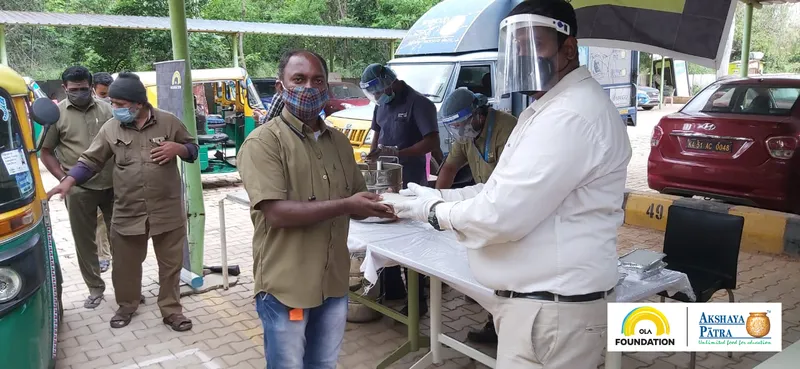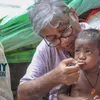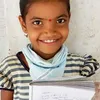NGOs to the rescue: Indian non-profits help unprivileged children with education and food amidst pandemic
In a bid to curb hunger, lack of education, child labour, and child marriage during the pandemic, Indian NGOs are ensuring poor children are well-fed and educated. Here’s how they are doing it.
For the second-largest populated country, the COVID-19 pandemic posed many challenges. In India, with schools shut down and a nationwide lockdown imposed, children had to do away with physical classroom learning and adapt to online education.
However, for the underprivileged children, belonging to rural pockets of the country, the pandemic almost halted their lives. Not only did their learning stop due to the pandemic, poor internet connectivity, and unavailability of smartphones, but these children also found it hard to get proper meals.
In fact, these collateral damages have also led to the rise of child marriages and child labour in the country. In a bid to help overcome these challenges, several NGOs have started various initiatives, catering to the needs of the children amidst the pandemic. Here’s how they are doing it.
Akshaya Patra Foundation

Ola partnered with Akshaya Patra Foundation to distribute meals to drivers
The Akshaya Patra Foundation needs no introduction when it comes to meal programmes. During the lockdown, it distributed close to 9.2 crore meals to the underprivileged children and their families.
In fact, it introduced happiness kits which include nutritious food items, hygiene kits, immunity boosters, and learning materials for children to go back to school. These kits are distributed in Bengaluru, Jigani, Hyderabad, Thane, Silvassa, Jaipur, Vadodara, Lucknow, Vrindavan, and Guwahati.
Moreover, the non-profit plans to restart its ‘Back-to-School’ initiative to help underprivileged children get proper education amidst the pandemic.
It has also partnered with multiple organisations, including Sun Life Asia Service Centre India(ASCI), Deutsche Bank, and Ola Foundation, among others, to execute its COVID-19 relief work in various places.
Smile Foundation

NGO Smile Foundation has been educating poor children in India across 25 states. Additionally, it also works in healthcare, livelihood, and women empowerment verticals in over 2,000 villages.
During the lockdown, the NGO has been ensuring the underprivileged sections and displaced migrant labourers are provided with ration kits and meals through its partnerships with PepsiCo, KFC India, and others.
These ration kits include rice, dal, salt, oil, sugar, masks, sanitary pads, soap, and other essentials. Besides, it is also providing teleconsultation and medical assistance across the most affected states.
In fact, the Smile Foundation has partnered with the NASSCOM Foundation and QuEST Foundation to educate school children. Through this partnership, the NGO aims to educate one adult in every household in rural communities.
It had organised a week-long, pan-India painting project in April to keep children engaged and entertained with colours.
Nirbhed Foundation

Children taking classes through the 'Main Bhi Hoon Shikshak' initiative, in their own smaller circles
Nirbhed Foundation was started by two individuals — Sushil Kumar Meena and his classmate Taruna — to educate poor children for free.
Catering to over 3,700 kids, Nirbhed started an initiative called ‘Main bhi hoon shikshak’ (I am also a teacher) in the middle of the pandemic. The initiative aims to train senior children from a particular area to teach younger children as a salaried initiative, thereby financially aiding their family. It is also preventing the bigger problem of child labour issues in the country.
During the lockdown, the NGO distributed ration kits to about 4,300 families, as well as adopted 2,200 families, who received regular meals. In fact, Nirbhed Foundation claims to have distributed over 40 lakh meals to needy families.
Hinduja Foundation

Distant learning in villages with iCare
Hinduja Foundation works in the verticals of education, healthcare, water stewardship, and rural development. It started the ‘iCare: Volunteer from Home’ initiative, wherein over 600 Hinduja Group employees volunteered to educate kids from home.
These classes ranged from curriculum-based science and mathematics to co-curricular activities like art, dance, music, etc. The well-funded initiative catered to more than 5,500 students across villages in India. In the second phase, it connected the rural children to a common device set up in a common area.
Apart from this, it has also distributed rations kits to distressed families as a part of their rural development programme, and has provided teleconsultation services to aid mental health.
Notun Jibon

Under Notun Jibon, street children are educated by the team
Founded by Arup Sengupta in 2016, Notun Jibon — meaning new life — aims to educate the children of slum dwellers, sex workers, and low-income parents, as well as ensures that they are well fed. Through its school, Sahaj Path, the NGO involves children in basic subjects along with dance, music, and physical exercise.
While the classes were stopped due to the pandemic, the NGO soon plans to reopen the school with strict social distancing and hygiene practices.
To tackle the challenges brought on by the pandemic, the NGO makes it a point to distribute ration kits to the children and their families every Tuesday until things start to look better. It also distributes food and ration kits to about 400 sex workers who reside in red-light areas.
Edited by Suman Singh










